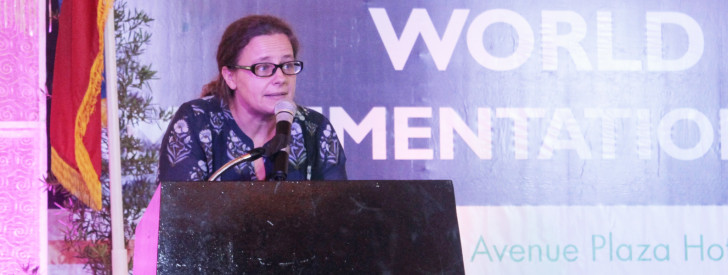 World Bank Lead Agriculture Economist and Task Team Leader Ms. Frauke Jungbluth discussed the objectives of the Bank’s 2nd Implementation Support Mission to the PRDP South Luzon cluster during the kick-off meeting held on April 11 at the Avenue Plaza Hotel in Naga City. (Photo by Ana Francesca Chavez, DA-PRDP PSO South Luzon InfoACE Unit)
World Bank Lead Agriculture Economist and Task Team Leader Ms. Frauke Jungbluth discussed the objectives of the Bank’s 2nd Implementation Support Mission to the PRDP South Luzon cluster during the kick-off meeting held on April 11 at the Avenue Plaza Hotel in Naga City. (Photo by Ana Francesca Chavez, DA-PRDP PSO South Luzon InfoACE Unit) WB Team Leader on PRDP review mission: “This is always the good time to look at what works, what doesn’t”
Reviewing what works and what does not work to realize what needs to be done is the focus of the second implementation support mission, stated Ms. Frauke Jungbluth, Lead Agriculture Economist and Task Team Leader from the World Bank.
Ms. Jungbluth shared that the mission, which happens biannually, serves as a good venue to review the progress achieved since the last mission. She added, “Now it’s about how you will move these things forward.” She also posed the question, “How can we ensure you are well-equipped to face the challenge?”
During the kick-off meeting for the Bank’s mission to PRDP’s South Luzon cluster, PRDP National Deputy Project Director Arnel De Mesa reminded everyone about the project’s main development objectives that include increasing the incomes of farmers, the value of agricultural products, and the number of farmers and fishers with improved access to the Department of Agriculture services. Director De Mesa then presented the PRDP accomplishments and updates with emphasis to those of the South Luzon cluster.
In his cluster report, PRDP South Luzon Project Support Office (PSO) Director Shandy Hubilla shared that through PRDP, farmers can have what they deserve and they will no longer be at the mercy of traders. He added that through PRDP sub-projects, implementers down to the provincial and municipal levels are capacitated about the processes through guided trainings so that they would have the sense of ownership to their sub-projects.
Director Hubilla highlighted the accomplishment of the cluster’s I-PLAN or local and national level planning component in mainstreaming provincial commodity investment plans (PCIPs) and having them endorsed by the Provincial and City Development Councils.
Instead of having private value chain analyses (VCAs) consultants, through participatory planning process, the PSO guided and mobilized Regional Project Coordination Offices and Provincial Project Management and Implementation Units to craft VCAs. The cluster also works on directly linking the PCIPs to promising markets and investors through its partnerships with different government agencies to ensure that PCIPs are utilized and maximized.
“PRDP is a way for us to free our people from poverty,” claimed OIC Regional Executive Director Elena Delos Santos. For her, hosting the mission is a way for the Bicol region to thank the Department of Agriculture and the Bank for the opportunity of bringing PRDP sub-projects in the region.
During the open forum, Douglas Forno, Institutional Specialist from the Food and Agriculture Organization, commented about the difference of having sub-projects approved and getting them implemented. He said, “When we get back six months from now, we would like to hear about sub-projects getting implemented” more than the number of approved sub-projects. He also pointed out that I-REAP or enterprise development sub-projects called small livelihood projects for calamity-affected communities should be treated not as livelihood projects, but as microenterprises.
The team of specialists from the World Bank and concerned components from the PSO and the Bicol RPCO visited the I-BUILD or infrastructure development sub-project in Oas, Albay and the I-REAP sub-project in Labo, Camarines Norte. The said teams were grouped for the visit to the two sub-project sites.
The I-BUILD sub-project entitled “Rehabilitation/Improvement of Pistola-Tablon Road with 3 units Bridges” in Oas, Albay is expected to benefit at least 3,213 households and 1,632 farmers and fisher folks. Meanwhile, the I-REAP sub-project “Camarines Norte Queen Pinenapple Trading and Processing Project” in Labo, Camarines Norte will benefit at least 9,140 individuals from the proponent group and is expected to multiply as the enterprise expands through PRDP’s support.
Issues among PRDP components and units about noncompliant contractors and local government units, delayed submissions of reports, and misunderstandings about the PRDP processes were discussed during the mission’s break-out sessions and exit conference.
Ms. Jungbluth stressed that the mission is a good venue to evaluate what has been achieved and what practices worked and what did not, so that the implementers and managers can plan and perform better for the succeeding stages of the project. ### (Gumamela Celes Bejarin, DA-PRDP PSO South Luzon InfoACE Unit)
